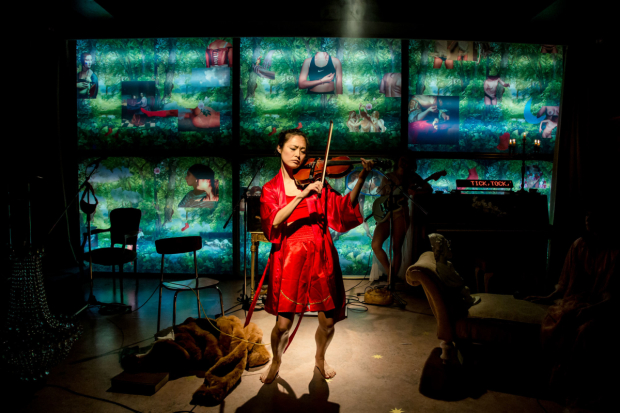RashDash's #TimesUp Three Sisters pushes male plays off their pedestal
Matt Trueman reflects on the radical reworking of RashDash’s new production of Chekhov’s play

© Richard Davenport
Anton Chekhov is all over the Royal Exchange. If Rory Mullarkey's main stage Cherry Orchard is, as I wrote of it, a loving restoration, then RashDash's Three Sisters is an act of rebellion in the studio next door. Abbi Greenland, Helen Goalen and Becki Wilkie take Chekhov on. They rebut the way he wrote women, they resist the way he wrote plays and they rip into the idea of his work as canonical – the canon of classics being the product of patriarchy. These Three Sisters Are Doin' It For Themselves.
Their point is that we put the playwright on a pedestal – a white faux-marble bust of his spectacled face rotates, mockingly, on a pink plinth onstage. RashDash's beef isn't (entirely) with Chekhov, but with the way we position men's plays: the countless revivals and reverence on repeat. "If you want to be taken seriously," Greenland parrots one AD, "It would be sensible, at some stage, to engage with the classics". That means women in nice frocks on chaise longues, swooning over their suitors, as – quote – "Men make speeches". It means making more room for male voices, men's views of the world, male patterns of thought.
I'll never look at a Chekhov play in the same way again
What we get instead is Chekhov as cabaret: a selection of skits, songs and stomping dance sequences that dart in and out of Three Sisters itself. RashDash play the Sergeyevna sisters as starched, doll-like figures – puppets of the patriarchy, or "figments of some old white guy's imagination". They talk, stiffly, about dresses, parties and partners, then swerve, anachronistically, onto Snapchat, contraception and kids. There's some truth in these women, and they're still with us today, but RashDash ask what truth and, if so, why? They re-frame the three sister's Chekhovian ennui as the boredom of women stuck in their sitting room while men run the world. No matter how many costume changes they go through – from ballgowns to bear suits – the picture never changes.
But the structure does here – with glorious effects. Songs burst out of the action, Greenland belting a surging hymn to heartbreak as Masha, Wilkie twisting Tchaikovsky into tumbling piano pop. They break out into angry, ecstatic dance, overturning the furniture and kicking up a storm as drum and bass fills the room. Dressed as the Spice Girls, knocking the way women get boxed into type, they howl their heads off and bare each other's bums. It's a blast: fiery, funny, sexy and punk. And female to its foundations. Instead of four acts in order, RashDash jumble things up. They carve open a space for female expression: pop music and movement, fashion and frivolity instead of dialogue, action, characters and plot.
They break out into angry, ecstatic dance, overturning the furniture and kicking up a storm as drum and bass fills the room
Behind them, a red rolling message board stands in for Chekhov's clock: TICKTOCK TOCKTICK. It's a symbol, not only that time is definitely up, but for a measured, metered and, yes, male sense of time. RashDash overrule it. They find a feminist flow.
And it's fun, really fun – not a word one often associates with Chekhov. No matter how hard he insisted that his plays were comedies, Chekhov was and still is a poet of ennui: an existential ethnographer who studied species of angst. He wrote sighs that have shaped (still shape) our sense of the world. RashDash object: If the Chekhovian spirit is held up as universal, part and parcel of the human condition, that's only because he's been put on that plinth. And by whom? By men – or, rather, by a patriarchal society that saw its lived experience reflected in these plays, enshrined them as classics and set that up as the norm. A splendiferous, scathing rap runs through old reviews (mine included) about "MAN's production" of "MAN's play" performed by "MAN". It's an accusation – we critics are as complicit as Chekhov himself – but it's also an exorcism: a burning up of old ways. It does just the job. Thanks to RashDash, I'll never look at a Chekhov play – any old play – in the same way again. (Promise?)



















